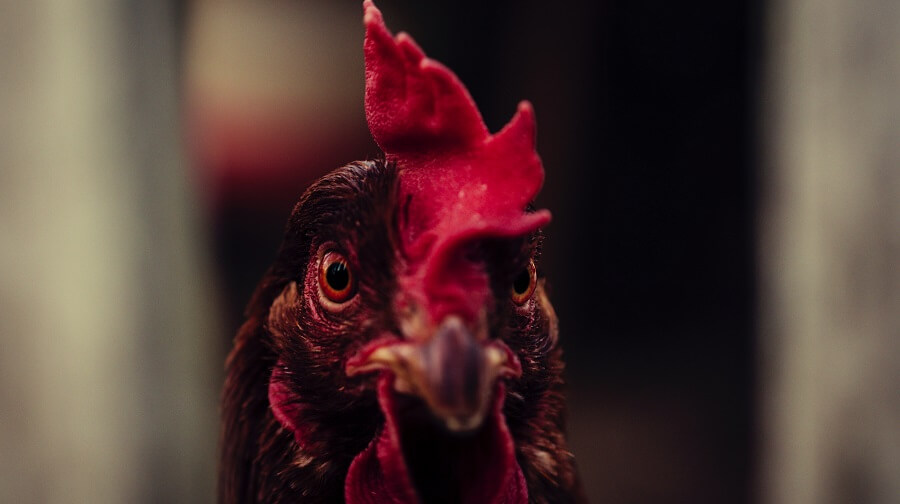Every time my kids see a chicken pecking at another chicken they become worried about the picked on chicken. But the pecking order is a very real and established instinct in chickens.
So, how do you tell the difference between the pecking order and a bully chicken? And, how do you ensure a peaceful flock?
What is the pecking order? The pecking order is a hierographical order of chickens from the strongest, healthiest to the smallest and weakest chicken. It determines which chickens get to eat first and the most, and which ones get the leftover food. In the wild, the pecking order preserves the entire flock as the strongest and fittest chickens survive.
The Difference Between The Pecking Order And Bullying
While the pecking order is natural and can’t be eliminated in a flock of chickens, bullying is dangerous and can become deadly.
The pecking order determines which chickens get the first pick of the food, water, and other resources. The head chicken gets their choice of perch and nesting boxes.
Usually, the roster is at the top of the pecking order. If your flock is entirely hens, then a head hen will rule the roost.
The pecking order is designed to separate and push away weak or injured chickens so that the healthiest and strongest chickens get the best chances of survival. In the wild, the flock was only as strong as the weakest member.
New chickens start at the bottom of the pecking order. But, as they challenge the lower chickens in the order, they will gradually rise until they reach a point where they won’t challenge stronger chickens or they have risen to the top of the order.
The pecking order becomes bullying when a chicken or multiple chickens cause harm or injury to another chicken.
This can be by preventing a chicken access to food or water. It can also happen when a chicken is injured by the bully. Chickens go into a frenzy at the sign of blood and even mellow chickens can turn on a coop-mate pecking at the wound.
Bullied chickens become injured, often lose many of their feathers, and may lose weight. In some cases, the sight of blood will cause the flock to peck until the injured chicken is dead. The bullying then turns into cannibalism.
It’s gruesome.
While the pecking order settles down into peaceful coexistence, bullying creates consistent fear in the bullied chicken.
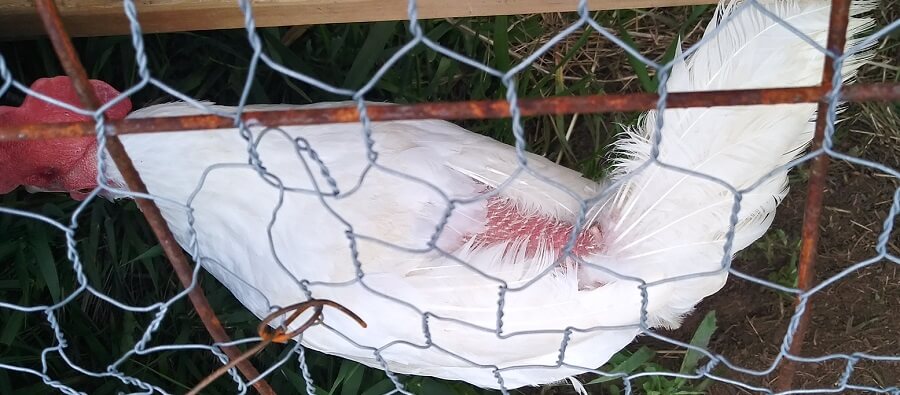
How To Identify Signs Of Bullying In A Flock
Bullying may occur while the flock is cooped up or when you aren’t around. Often the flock will identify an ill or weak chicken before you may notice it. This will cause bullying to start.
Watch for these signs of bullying:
- Missing feathers from the neck or bottom of the chicken
- Chickens that have lost weight
- Cowering chickens
- Loss of egg production by specific chickens
- Blood or injury
Causes Of Chicken Bullying
There are many reasons for bullying within a flock.
- Specific chicken personalities will make them bullies
- Specific breeds are more prone to bullying
- Stress
- Boredom
- Overcrowding
- Sickness or weakness
- Broodiness
Fortunately, most of the time, bullies can be reformed and peace returned to the flock. There are several steps that you should take when bullying is occurring.
Chicken Breeds More Likely To Bully Other Chickens
A chicken’s breed can help to determine where on the pecking order it will be in a mixed flock. A wider variety flock will help the different looking chickens to fare better than if a milder chicken is placed in a flock with a lot of similar breeds.
If you have any crested chickens, then it is best to have many birds with crests of different colors and sizes so that your flock can learn what a “chicken” looks like.
Otherwise, a crested chicken will be picked on by the other breeds.
But, even in a mixed flock, certain breeds will be more likely to be bullies than other breeds. The chicken breeds more likely to bully are:
- Dominique
- Egyptian Fayoumi
- Leghorns
- Modern English Game
- Old English Game
- Plymouth Rock
- Rangers
- Welsummer
- Wyandotte
Many chicken breeds fall in the middle range. New Hampshire Reds, Dorking, and other breeds will usually fall into the middle of the pack.
Next, if you are getting any of these breeds, be aware that they are mellow and more likely to be bullied by more aggressive birds.
If you plan on a mixed flock, raise your milder birds first so that they are adults when you introduce the aggressive youngsters to the flock. This will help to reduce stress and pecking order within your flock.
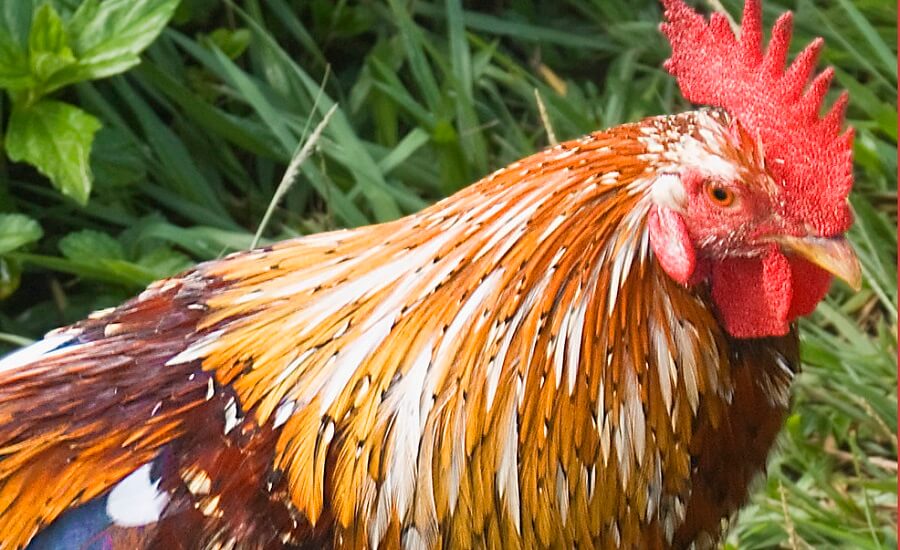
Chicken Breeds Less Likely To Bully Other Chickens (And More Likely To Be Bullied)
Mild and calm breeds are more likely to fall at the bottom of the pecking order. Not all birds that are friendly to people are also friendly to other chickens.
Plus, birds with crests and cheek puffs are more likely to be pecked at and bullied by other breeds. It’s usually worse because crested birds have limited vision and can’t see or defend themselves as well.
If you have a crested bird that is being picked on relentlessly, try trimming the feathers around the eyes to give her a little more vision.
The birds more likely to be at the bottom of the pecking order in a mixed flock are:
- Ameraucanas, Easter Eggers, Araucanas
- Australorp
- Cochin
- Crevecoeur
- Faverolle
- Marans
- Orphington
- Polish
- Silkie
Every individual chicken has its own personality. Some aggressive breeds may proffer a more mellow chicken. Or, you may see a mellow chicken be more aggressive.
Keep reading for steps you can take to eliminate bullying in your flock.
How To Stop Bullying In Chickens
With rare exception, bullying can be treated and chickens reformed. Chickens tend to follow the flock and when one bully picks on another- the others will quickly follow.
Fortunately, you can reform excessive pecking by taking some of the steps below.
Offer Multiple Feed And Water Stations
When food is scarce or there isn’t’ enough feeding and watering stations, the smallest chickens can be kept from eating or drinking. This can cause them to grow weaker and increase the chances of bullying.
Add some additional feeding and watering stations that are away from your original stations. Or, if you already have multiple stations, try spreading them out. One station for 4-5 birds is usually ideal.
Offer Hiding Spots For Picked On Chickens
Give your little chickens places to hide from bullies. This can come in the form of various perches, hay bales, or other items to hide behind.
In addition to offering protection, these things will also offer more entertainment for your flock.
Just make sure that you don’t create dead ends where bullied chickens can be trapped and picked on relentlessly by a ringleader.
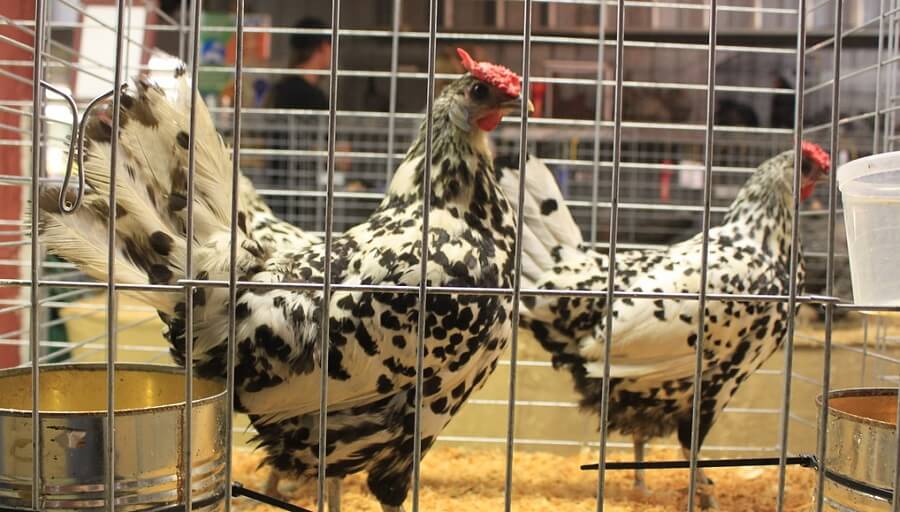
Reduce The Stress On Your Flock
Stressed birds are lots more likely to turn on each other. As a result, stress is the first thing I watch for when the pecking order seems to be getting out of control.
Another sign of stress can be a reduction in egg-laying production with your hens.
Watch for stressors such as dogs running around your chickens. Even if the dogs are friendly, it can stress the flock out. Sometimes you might even be the stressor if you are interrupting egg-laying time in the morning.
Another stressor might be leaving a coop light on all night. Chickens need dark to sleep well and having a light on all night can stress them out and interrupt their sleep. Chickens should have about 12 hours of dark at night, even though they do need about 12 hours of light to have good egg production also.
A scarcity of food or water can also stress out your flock so make sure they have enough to eat. This is more critical if your flock doesn’t free-range or during colder months of the year.
- Outside stressors such as dogs or other animals
- Being interrupted during egg-laying times
- Not getting enough dark hours to sleep
- Scarcity of food or water
Provide Entertainment And Stop Boredom
Bored chickens act like squabbling siblings on a long road trip. If your chickens are fighting and pecking on each other, try to offer them more things to do.
Boredom becomes a bigger problem during the winter when there isn’t as much to do outside and chickens are cooped up for long hours at night.
Try introducing new foods, perches, and items for your chickens to climb on, roost on, and dig through.
Chicken toys can be easily made from everyday items. Check out this article on how to entertain chickens.
Give Them More Space
Another common cause of bullying is overcrowding. Chickens that don’t get enough personal space start to pick on each other. They definitely need their own space and quiet time.
It may seem like chickens don’t need a lot of space because they perch huddled up and crowded together. But, they do need to have access to their own space during other parts of the night or day.
If possible try letting out your girls to free-range during the day. This will alleviate the crowded stress they are feeling and allow the picked on ladies to get away from the bullies.
Another thing you can try is to let your ladies out earlier in the day. They may simply feel too cooped up all night and need more time outside.
Consider expanding their coop or run to give them more room if free-ranging isn’t a possibility.
- Let chickens out to free-range
- Let them out of the coop earlier in the day
- Expand the coop
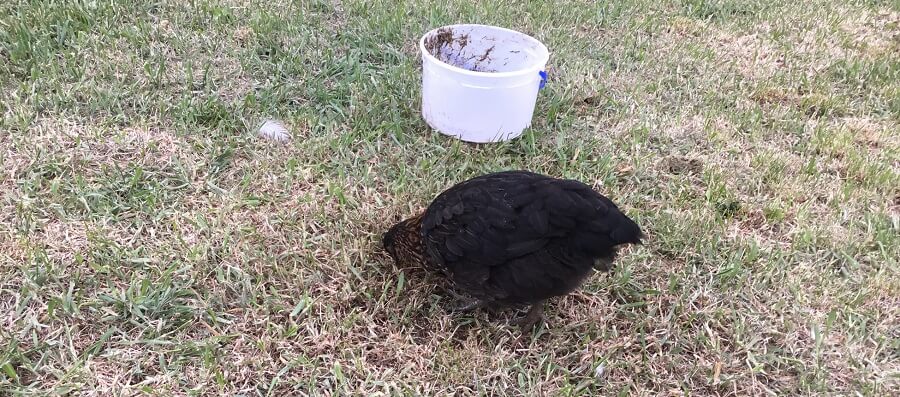
How To Handle Bullying Of Sick Chickens
Sick chickens can be a sudden target for bullying and the bullying can make the chicken even sicker. Chickens aren’t that great at compassion.
The best thing to do with a sick or injured chicken is to isolate it. If the chicken is injured but not ill, then it’s best to isolate it within the coop.
Isolation will allow your bullied chicken to be part of the flock without becoming a complete stranger to them that full isolation would do.
You can simply section off part of the coop with chicken wire or use a dog or rabbit cage to keep your injured chicken in.
If your chicken is ill or may have caught something, then consider isolating her away from the flock to avoid exposing the others to the illness.
Helping A Chicken To Rise In The Pecking Order
If a bullied chicken isn’t hurt or injured but is constantly bullied by other chickens, then you can help her to rise up in the pecking order. Isolate her again, but allow her more freedom. Let her free-range in front of the rest of the flock.
That will naturally drop the rest of the flock to a lower status than the free chicken and help her to reintegrate into the flock.
Stop Broody Chickens From Brooding
Broody chickens are hens that are determined to hatch an egg. At some point, most chickens will become broody at least once.
It doesn’t matter if the egg is unfertilized or will never hatch, your girl wants to be a mother!
Broody hens become very protective of their unhatched eggs. They can be super aggressive. They rarely leave the nesting box, even when other hens want to lay an egg. Other hens can become fearful of a broody hen.
You can break broodiness in a hen by moving her to a wire cage. The wire cage won’t allow her bottom to get warm enough to hatch an egg. During the night let her back into the coop to roost, but return her outside to her cage again during the day.
After 5 or 6 days, her broodiness will usually be gone.
- MOve the broody chicken to a wire cage
- Only allow her into the coop at night to roost
- Allow her to free-range, but keep the coop doors closed
How To Reform A Bully Chicken
First, identify the ringleader. Some chickens are more of a bully than other chickens. They bully even when lower level chickens don’t challenge the pecking order.
You can usually break a bully chicken of meanness by isolating them.
Once again, keep the isolated chicken in the coop with the flock, but isolate them in a cage or separate section.
Keep them separated for 2 weeks. The pecking order will rearrange without the mean chicken and when she is reintroduced, she will be the newest member again at the bottom of the pecking order.
If your chicken is still mean, put her back into the cage for another week. Let the flock free range in view of the mean chicken. This helps to pull her down on the pecking order also.
You can take the same steps with two bullies, but introduce them back into the flock on different days and keep them separated from each other.
- Separate the bully within the coop
- Allow the bully to see the rest of the flock free-ranging
- Introduce bullies back into the flock on different days
Does it work?
My three leghorns were tormenting our younger Easter Eggers. But, after isolating them in a chicken tractor for a couple of days while the other chickens ran about, things changed.
When the Leghorns were allowed back out, the dynamics of the flock had changed and they were no longer bullies to our newest additions. The littles were only about 3 weeks younger, but we had previously experienced excessive bullying and they were terrified of the bigger birds.
Even when my girls held them, they got scared when the Leghorns came for treats. After separation, the younger hens no longer acted scared. This showed us that even at night, they weren’t getting picked on anymore.
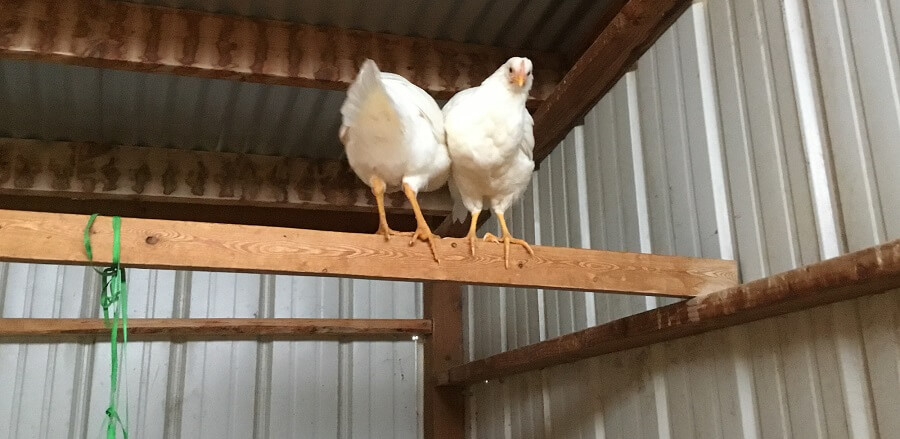
How To Introduce New Chickens To An Existing Flock
New chickens are naturally the lowest chickens in a flock’s pecking order. When you have an established flock and want to introduce new chickens, wait until the chickens are full sized or nearly the size of the existing chickens in the flock.
First, introduce them into the coop, but keep them isolated. Never introduce only one chicken to a flock. Introduce at least two chickens at a time.
After a week or two, allow your newbies to be introduced into the flock. Watch for excessive bullying that continues more than a day or two.
How To Introduce Roosters To Other Roosters
Roosters generally don’t like other roosters unless they grew up with them. Be careful when you want to introduce another rooster to an existing flock with roosters.
Some chicken raisers have luck by introducing younger roosters to a mellow, older rooster. The older rooster is able to teach the young ones how to behave and to keep them in line.
After that, they can be introduced to the rest of the flock.
Commercial Solutions To Help With Bullying
There are some products available to help with bullying.
Chicken capes help to protect the backs of bullied chickens and keep them from getting further injured.
I also saw this video on chicken glasses, which blinds them to the color red and makes them unable to identify blood on injured chickens.
It makes chickens much less likely to pick on an injured chicken. I’ve never used them but they seem to be very popular.
Conclusion
Most mean chickens can be reformed to get along within a chicken coop. If you identify the problem and solve it, usually with space or entertainment, then the problem usually resolves itself. In my experience reforming a mean chicken is fairly simple- the hardest part was building my own chicken tractor to isolate it.
If you are trying to decide what types of chicken breeds to purchase, don’t forget to check out fun breeds that are also great for eggs and meat.
My Favorite Chicken and Duck Supplies
This list contains affiliate products. Affiliate products do not cost more but helps to support BestFarmAnimals and our goal to provide farm animal owners with accurate and helpful information.
Manna Pro Oyster Shell keeps eggs strong. Before I gave my chickens oyster shell, I had the oddest eggs, many with weak and irregular shells. Now, I don’t have an issue.
Layer Feed by Manna Pro. I like pellets rather than crumbles as my chickens eat them better and less gets wasted or scavenged by rodents. A good layer feed makes the difference in hens laying many more eggs.
My chickens love this mealworm treat, which gives added protein, something that’s great during molting and winter months.
There are many ways to feed and water your chickens. I like this food and water setup the best because it reduces waste, saves me time feeding and watering, and keeps the food fresh longer. Except, in the winter, I use a heated waterer. The only problem is the heated waterers need to be replaced every few years.
I love this chicken veggie hanger. It makes it easy to give your chickens produce from the garden and keep them occupied in the winter with a fresh head of lettuce.
These chicken toys are a hoot! They will help curb bullying and keep your chickens active, especially in the winter when hens tend to get more lethargic.

